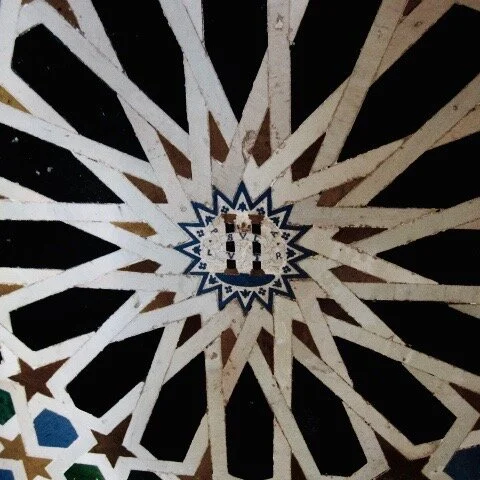To begin, please excuse the ‘punny’ title. We all have to find some sort of entertainment at this time … In any case, the contributions in this edition of the SNAP bulletin will more than compensate for this cringe-worthy heading. We have three wonderful posts from members of our community that highlight the artistic and creative connections across North Africa and Europe - an apt prelude to the 2021 SNAP sponsored conference on sensoria (see Andrew Devereux’s update for more).
While the ‘stay in place’ orders might have deprived us from some of our usual sensory experiences - music shows, engaging with non-virtual humans, exploring cityscapes - our contributors attempt to fill that void. We begin with Jonathan Glasser’s photo essay, which traces the backgrounds and connections of several musicians and dancers who performed in the Algerian tent at the 1889 World Exposition in Paris. In doing so, Jonathan Glasser helps us to reframe our view of the Algerian music revival by examining the diversity of the actors involved in its prehistory. Following chronologically, Liz Matsushita has prepared a beautiful story map that tracks the transnational geographies of participants in the 1939 First Congress of Moroccan Music in Fez. This multi-media platform helps to emphasize the breadth of the intellectual networks in which the North African musicians and scholars operated. Finally, Randa Jebrouni brings us back to the present with a brief interview and précis of her new book: La letra y la ciudad: Tánger en las literaturas española y marroquí actuales. In it, Randa Jebrouni invokes theories of topophilia, psychogeography, and nostalgia to showcase how contemporary Spanish and Moroccan authors use the space of the city as a vital place in Morocco for recovering the past in its various manifestations.
In all three posts our authors invite us to rethink temporal, geographic, and paradigmatic contingencies to explore a diversity of connections - diving more intimately into the histories of the musicians, authors, and scholars involved. We hope that these stories will provide a welcome respite to our members during this time of pandemic.
-
February 2024
- Feb 8, 2024 On Earth or in Poems - An Interview with Eric Calderwood Feb 8, 2024
- January 2024
-
October 2021
- Oct 1, 2021 Bulletin Fall 2021 Oct 1, 2021
- Oct 1, 2021 Director's Update Oct 1, 2021
- Oct 1, 2021 Remembering ʿAbbas Ibn Firnas Oct 1, 2021
- Oct 1, 2021 Eighteenth-Century Moroccan Diplomacy: A Network Analysis Oct 1, 2021
-
May 2020
- May 2, 2020 'SNAP'ing our Fingers for Music and Literature May 2, 2020
- May 2, 2020 An update from Andrew Devereux, SNAP President May 2, 2020
- May 2, 2020 Breaking the Colonial Spell: A Musical Perspective from Algiers via Paris May 2, 2020
- May 2, 2020 Making Moroccan Music at the 1939 Fez Music Congress May 2, 2020
- May 2, 2020 La letra y la ciudad: Tánger en las literaturas española y marroquí actuales May 2, 2020
-
December 2019
- Dec 29, 2019 Connected Experiences in the Mediterranean Dec 29, 2019
- Dec 29, 2019 A Muslim in Europe a Christian in North Africa: Experiencing the Early Modern Mediterranean Dec 29, 2019
- Dec 29, 2019 "The Captive Sea": An interview with Daniel Hershenzon Dec 29, 2019
- Dec 29, 2019 Announcements Dec 29, 2019
-
July 2019
- Jul 8, 2019 Inaugural SNAP Bulletin, Summer 2019 Jul 8, 2019
- Jul 8, 2019 SNAP Director’s Update July 2019 Jul 8, 2019
- Jul 8, 2019 A Journey with al-Miknasi through Spain c. 1779 Jul 8, 2019
- Jul 8, 2019 Colonial Al-Andalus: An interview with Eric Calderwood Jul 8, 2019
- Jul 8, 2019 Arts Feature: Our Dream was to Rescue Jul 8, 2019
- Jul 8, 2019 Grant Updates Jul 8, 2019
-
May 2018
- May 31, 2018 New Board Member and President Announced May 31, 2018
-
March 2017
- Mar 2, 2017 Andalusi Musical Traditions and Maghrib Workshop Program Mar 2, 2017
-
January 2017
- Jan 27, 2017 Andalusi Musical Traditions and Maghrib Studies Workshop Jan 27, 2017
-
September 2016
- Sep 21, 2016 Art and Ideology in the Twelfth-Century Western Mediterranean (Program) Sep 21, 2016
-
July 2016
- Jul 22, 2016 Art and Ideology Symposium at Bard Graduate Center Jul 22, 2016
-
May 2016
- May 12, 2016 Spring Letter May 12, 2016
-
May 2014
- May 24, 2014 The Aghlabids and Their Neighbors May 24, 2014
- May 2, 2014 LMU Conference Program May 2, 2014
- May 2, 2014 SNAP Conference at LMU May 2, 2014
- May 2, 2014 LMU Conference Program May 2, 2014
-
May 2013
- May 24, 2013 SNAP-Ashgate Partnership May 24, 2013
- May 24, 2013 Iberian and Exchange, 475-1755 Book Series May 24, 2013
- May 24, 2013 Mediterranean Studies Book Series May 24, 2013
- May 23, 2013 Executive Director’s Update 4 May 23, 2013
-
February 2012
- Feb 29, 2012 Director’s Update 2 Feb 29, 2012
- Feb 29, 2012 Director’s Update 3 Feb 29, 2012
-
January 2012
- Jan 31, 2012 Symposium Report Jan 31, 2012
- Jan 5, 2012 AHA Panel Jan 5, 2012
-
December 2011
- Dec 31, 2011 Journal of North African Studies (Special Issue) Dec 31, 2011
- Dec 2, 2011 MESA Rountable Dec 2, 2011
-
November 2011
- Nov 30, 2011 Catholic University of America Symposium Nov 30, 2011
- Nov 30, 2011 Program for Symposium at CUA Nov 30, 2011
-
October 2011
- Oct 16, 2011 Executive Director’s Update Oct 16, 2011
-
August 2011
- Aug 30, 2011 ASPHS Report Aug 30, 2011
-
July 2011
- Jul 1, 2011 ASPHS Panel Series Jul 1, 2011
-
January 2011
- Jan 29, 2011 AHA Panel Series Jan 29, 2011
-
November 2010
- Nov 17, 2010 MESA 2010 Nov 17, 2010



